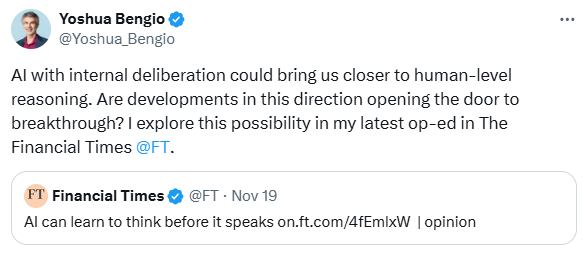Bengio and LeCun Debate AI's Path to General Intelligence
Artificial intelligence (AI) is at a transformative crossroads. As the technology evolves, critical discussions are taking place about its cognitive abilities and relationship with language. Two prominent voices in this debate are Turing Award winners Yoshua Bengio and Yann LeCun, who have offered contrasting perspectives on the future of AI and its potential to achieve artificial general intelligence (AGI).
The Shift Toward Reasoning and Thinking
AI development has traditionally centered around language models, but recent advancements are pushing the boundaries of what AI can achieve. Leading companies are now focusing on AI's reasoning and cognitive capabilities, which is evident in OpenAI's o1 model. This model has made remarkable strides in fields such as mathematics and coding, suggesting that AI can handle complex, logical tasks beyond mere language processing.
Bengio, in a recent article for the inancial Times contends that AI may soon reach a turning point where it can "think" before it can "speak." He believes this could represent a crucial step toward AGI. Historically, AI has been associated with System 1 cognition, which refers to fast, intuitive processes. In contrast, human intelligence is deeply rooted in System 2 cognition—slow, deliberate reasoning. Bengio argues that AI’s ability to develop reasoning skills could mirror the evolution of human thought processes.

The Role of Language in AI and Human Thought
The question of whether language is essential for thinking is central to the debate about AI's future. LeCun, another Turing Award winner, questions this assumption. Drawing on research from MIT, LeCun highlights studies showing that humans can still think without language. For example, patients with global aphasia—who suffer from severe language impairments—retain the ability to solve mathematical problems, understand cause and effect, and even create art. This suggests that thinking may be more fundamental than language.
While LeCun acknowledges that language is important for higher-order cognitive functions, such as social interaction and complex reasoning, he emphasizes that language is not a prerequisite for basic thinking. This insight opens up new possibilities for AI, raising the question: Could AI develop a form of intelligence that is fundamentally different from human cognition?
AI's Potential for New Forms of Intelligence
The possibility of AI developing a form of intelligence independent of language challenges traditional notions of cognition. As AI models such as o1 continue to evolve, they are showing the ability to solve complex problems without relying on human-like language structures. These breakthroughs could suggest that AI might follow a unique cognitive path, diverging from human thought processes.
This shift is particularly significant as it raises new questions about the ethical implications of advanced AI. As AI systems become more capable of complex reasoning, their potential to deceive and manipulate humans increases. Companies and researchers must balance innovation with caution to ensure that AI is developed responsibly.
The Future of AI: A Balance of Reasoning and Language
AI development is at a critical juncture. While the exploration of language models has yielded impressive results, the pursuit of reasoning abilities could be the next major leap forward. However, rather than viewing these two paths as mutually exclusive, the future of AI may lie in integrating both aspects—language and reasoning—into a cohesive framework that mirrors human intelligence in new ways.
Key Points
- Turing Award winners Yoshua Bengio and Yann LeCun offer differing views on the role of language in AI and its potential for AGI.
- Bengio believes AI could soon "think" before it "speaks," signaling a shift toward reasoning capabilities.
- LeCun emphasizes that language may not be essential for thinking, based on studies of patients with severe language impairments.
- As AI evolves, its ability to reason and think may lead to new forms of intelligence, distinct from human cognition.
- The ethical challenges of advanced AI, including the risk of deception, must be addressed alongside technological advancements.